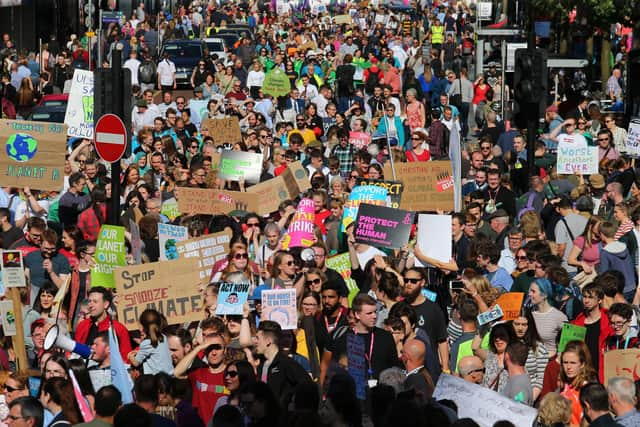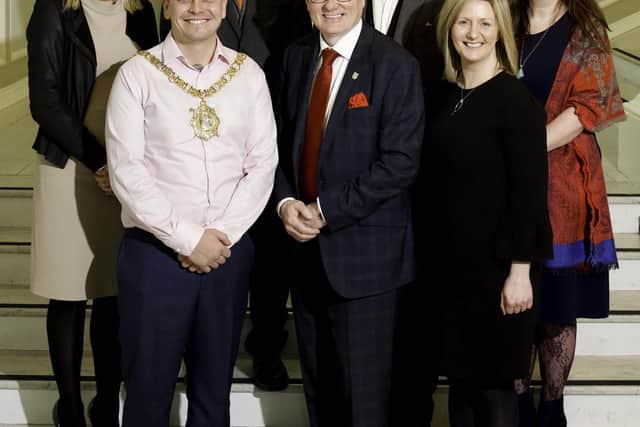NI teenager: I’d rather be in school than taking part in climate strikes


Anna Kernahan, a 17-year-old pupil at Victoria College in Belfast, said she would much rather be in school than taking part in climate strikes.
However she argues that she is being let down by an education system that isn’t telling “the full story” and therefore feels the need to take to the streets to raise awareness of the climate crisis.
Advertisement
Hide AdAdvertisement
Hide AdIn September between six and seven million took part in climate strikes across the globe.


Professor Ian Greer, President and Vice-Chancellor of Queen’s said the climate crisis is “the defining issue of our time”.
DUP’s Sammy Wilson has described man made climate change as “a con”.
Anna said: “I joined Youth Strike 4 Climate in May and I started Fridays for the Future in September.”
Advertisement
Hide AdAdvertisement
Hide AdBoth of the movements were inspired by 15-year-old Greta Thunberg who sat in front of the Swedish parliament every schoolday for three weeks, to protest against the lack of action on the climate crisis.


Anna said: “I’d heard about it on the news, through coverage of Greta Thunberg, I wanted to join myself.
“Climate crisis is taught very passively in school like it’s never really going to effect us. I’d never really thought about it before then because if it was that big a deal there would be national outcry but there just wasn’t.
“I researched more into it and realised there’s so much that they’re not teaching us.”
Advertisement
Hide AdAdvertisement
Hide AdAnna said: “You’ll get people saying we should be in school. They’re right, we should be in school.
“I don’t want to be sitting on a stone slab in the middle of winter but I have to.
“The whole point of the protest is that we’re not being taught the full story at school.
“For example I did GCSE Physics and we were taught that there were pros and cons to fossil fuels, it’s not seen as outright facts. I’m doing A-Levels now, and in Ecology it’s a debate more than actual facts.”
Facts from Armagh Observatory
Advertisement
Hide AdAdvertisement
Hide AdBased on measurements taken at Armagh Observatory 2019 was warmer and slightly wetter than average, but with fewer than average hours of strong sunshine.
Compared to records going back to 1796, mean temperature has shown a long-term increasing trend, though annual precipitation and sunshine have not.
The annual mean temperature was 10.24 C (50.4 F). This is 1.18 C warmer than the long-term (1796-2010) average.
Total precipitation was 866.90 mm (34.13 inches). The year provided approximately 6.5% more precipitation than the long-term (1838-2010) average.
Advertisement
Hide AdAdvertisement
Hide AdStrong sunshine hours totalling 1202.7 during the year, representing 88.3% of the long-term (1881-2010) average annual sunshine.
Professor Mark Bailey said: “It is noteworthy that despite what are typically quite large variations in rainfall from month to month and from year to year, the total annual precipitation at Armagh, like that for sunshine but unlike that for temperature, shows no strongly increasing or decreasing trend over timescales of the order of a hundred years or more.”
Of arguments between protestors and climate sceptics, Anna said: “There’s more confrontation on Twitter, people don’t have the confidence to do it to your face.
“We get the odd person at the strike come up to us and they aren’t very nice.
Advertisement
Hide AdAdvertisement
Hide Ad“The police come to the strikes, They’re there for our protection, not the other way round. Generally it’s kept at bay.
“It’s more on Twitter where you’ll have people saying you should be in school and getting abusive.”
Although it varies between schools, generally schools require notes from parents to allow their children to attend climate strikes during school hours.
Anna said the climate protests weren’t a passing phase: “This isn’t a fad that’ll go away. We’re not doing this because its popular. We’re doing it because the climate crisis is terrifying.
Advertisement
Hide AdAdvertisement
Hide Ad“The majority of us are under 18. We can’t vote for our future, we have no say in the decisions that will affect our lives so we have to do everything we can to raise awareness and influence the decisions of adults who are voting on our behalf.”
She continued: “People are definitely waking up to the crisis, especially with news sharing on social media.
“It’s started to come to the surface, it’s just not in mainstream reporting media yet.”
Of the influence she has on her peers at school Anna said: “People would see me doing things and ask me about it, but they don’t have the sense of urgency that me and the other climate activists in NISCN (Northern Ireland Students Climate Network) would.
Advertisement
Hide AdAdvertisement
Hide Ad“I would sometimes drag my friends down to the protests, but they wouldn’t go every single strike.”
She said: “We have a monthly strike and global ones every so often. In the first strike back in February we had 20 people, basically all from the same school.
“The one in September was massive. We had seven or eight thousand but that was an exception. That was a big tipping point in politics in Northern Ireland.
“Regularly now we have a few hundred. Even if people aren’t going they’re sharing it on social media and it’s making an impact.”
The next global climate strike is planned for April 3.
Advertisement
Hide AdAdvertisement
Hide AdOf her own effort to combat the climate crisis Anna said her family home was on a renewable energy plan.
She added: “I would try and cut down on beef because it has three times the carbon footprint as chicken. I’m not saying everyone should go completely vegan, we don’t live in a perfect world, but there are small things we can do.
“Like changing your milk to almond milk which I actually think tastes nicer than cow’s milk.
“Also I walk to school but that’s because I like walking.”
Belfast Climate Commission launched
In a bid to drive action on the climate crisis the Belfast Climate Commission was launched on Friday past.
Advertisement
Hide AdAdvertisement
Hide AdThe joint initiative between Queen’s University and Belfast City Council says it will play a key role in “place-based climate action” necessary to achieve the UK Government’s target of reducing greenhouse gas emissions to net-zero by 2050. The Commission is one of three city-based climate commissions across the UK (Belfast, Edinburgh and Leeds), funded by the Economic and Social Research Council for the Place-Based Climate Action Network (PCAN).
Working alongside existing city structures and programmes, the Commission has been established to translate climate policy into action ‘on the ground’ to bring about transformative change.
The launch event was addressed by Mayor Daniel Baker; the President and Vice-Chancellor of Queen’s University Belfast, Professor Ian Greer; and Belfast Commissioner for Resilience and Co-chair of the Belfast Climate Commission, Grainia Long.
Belfast City Council is opening a public consultation on a resilience strategy for the city which aims to transition to a low-carbon economy within a generation.
Advertisement
Hide AdAdvertisement
Hide AdMayor of Belfast, Councillor Daniel Baker said: “Like many cities, the impacts of climate change for Belfast will be profound.
“It is critical that we are well prepared, and protect all of our citizens, particularly the most vulnerable. We must also be ambitious in the targets we set to reduce our impact on the planet.
“I am particularly pleased to be launching this commission today because of its focus on place-based action and on the work that we can do to ensure climate resilient communities.”
Professor Ian Greer, President and Vice-Chancellor of Queen’s said: “The climate crisis is the defining issue of our time, and it is essential that we understand its impact for the places we inhabit.
“This major programme brings together the research community and decision-makers in the public, private and third sectors to find solutions in a collaborative way.”